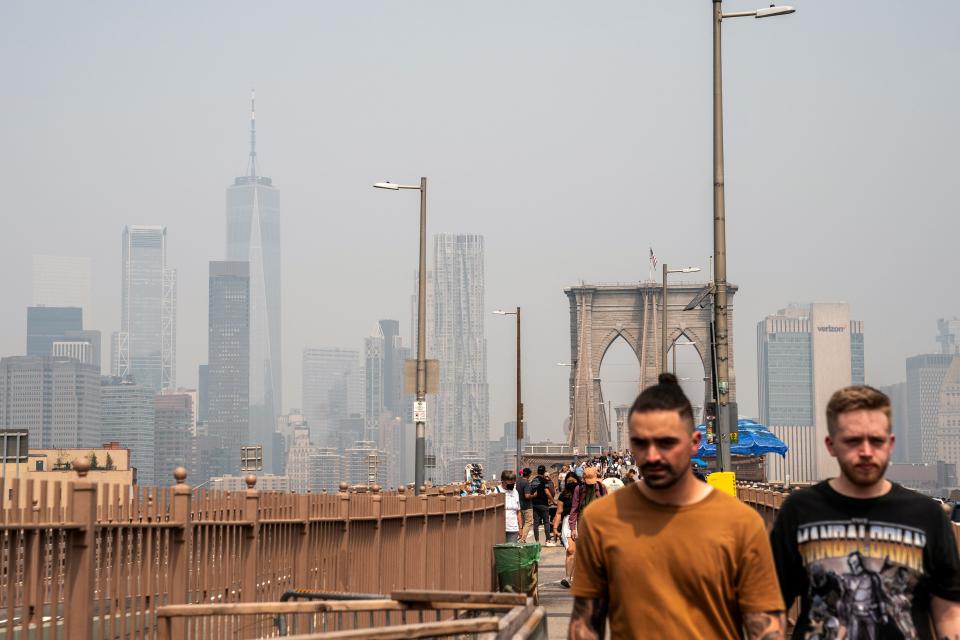Exclusive poll: Is climate change to blame for extreme weather in the East?
One in five Americans worry it will become more difficult to continue living in their current community due to climate change, according to an exclusive USA TODAY/Ipsos Poll. About the same number said they either don't know if climate change is happening or don’t believe in it at all.
The poll even found links between how Americans perceive the weather and their views on climate change, with people who don’t believe in climate change often less likely to report an uptick in extreme weather.
The pollsters asked the public if they personally experienced extreme weather events in the past month, as well as how frequently this extreme weather occurs compared to 10 years ago. Americans were asked about the frequency of extreme heat, droughts, wildfires, poor air quality, tropical storms and more occurring where they live.
Responses varied significantly, depending on where respondents lived.

Here’s how people living in the eastern US think about climate change and extreme weather events:
Has extreme heat become more frequent in Eastern states?
More than a quarter of people living in the northeast said extreme heat has become “much more frequent” in the last 10 years. Another 41% said the extreme heat became “somewhat more frequent,” while 21% said they saw “no change” in extreme heat weather patterns in the past decade.
The vast majority of respondents living in New England feel extreme heat has become more frequent. Nearly 65% of people living in the South-Atlantic and Mid-Atlantic states agreed that extreme heat has become more frequent.
Mid Atlantic (Pennsylvania, New Jersey, New York)
23% of Americans said extreme heat was much more frequent than 10 years ago
39% said extreme heat was somewhat more frequent
23% reported they witnessed no change in extreme heat
South Atlantic (Delaware, Washington, DC, Florida, Georgia, Maryland, North Carolina, South Carolina, Virginia, and West Virginia)
About 23% of respondents said extreme heat was much more frequent compared to 10 years ago
Forty-two percent said extreme heat was somewhat more frequent
Twenty-seven percent reported no change in extreme heat
What weather events are easterners most likely to experience?
Many Northeasterners reported experiencing severe thunderstorms and heavy rainfall in the month before the poll was conducted. Poor air quality was the highest reported at 81%, among those who say they experienced extreme weather events.
A third of South Atlantic residents who reported experiencing extreme weather events in the previous month said they experienced poor air quality, but nearly 75% reported extreme heat.
How do extreme weather events compare throughout the US?
Those who live in the West, which has experienced wildfire, drought and torrential rains in the past year, 30% said they thought it would be difficult to continue living where they live due to climate change. In the Midwest, which has experienced fewer extreme weather events, the number was 13%.
At the same time, 30% of all Americans strongly disagreed with the sentiment.
All Americans are worried about what's ahead. A full 68% said extreme weather events will become more frequent in the future. And 39% said climate change was negatively affecting their everyday life.
A sharp political divide on even the weather
The poll found extreme differences around beliefs about climate change depending on a person’s political leanings, even down to how they experience the weather.
Climate change overall is seen as a serious problem and something humans are causing. Just over half of Americans said climate change is mostly caused by human activity.
But just 28% of Republicans agree with that statement while 82% of Democrats and 56% of Independents do, the poll found.
Changing perspectives
On a positive note, some Americans did say they were willing to make changes. About one-third of those surveyed said in the next year they’d be likely to do things like walking or biking to close locations, paying $100 more in taxes to reduce pollution, or installing solar panels to help slow global warming.
The USA TODAY/Ipsos study was conducted in July of 2023 among a nationally representative sample of 1,024 adult Americans on the probability-based Ipsos KnowledgePanel.
Breaking records: Carbon dioxide soars to a new record in Earth's atmosphere as climate change continues unabated
A warming climate: Read how climate change is impacting everyday life
This article originally appeared on USA TODAY: How Americans in the East perceive climate change, extreme weather

